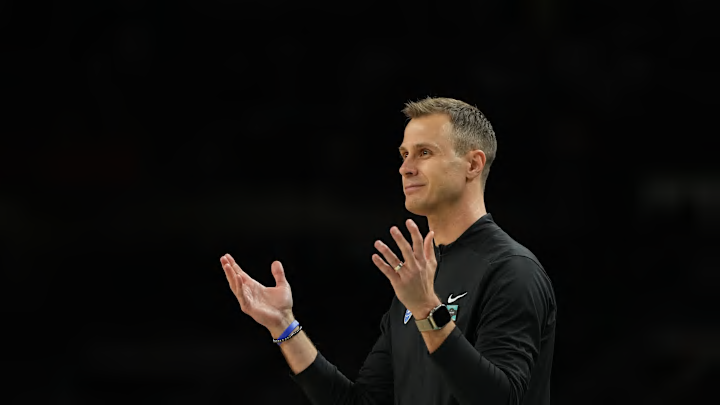By most coaches' standards, Jon Scheyer's first three seasons at Duke have been a success.
He led the team to an undefeated record on their home floor in his debut season. He brought the Blue Devils to the Elite Eight in his second year. And his total of 89 wins in his first three years tied a Division I record.
At Duke, however, success is measured in terms of championships. And though Scheyer has been inching closer each year, he hasn't gotten there yet.
Scheyer is a ruthless competitor, a strong motivator, and he possesses a keen basketball mind. He's a brilliant coach, and there's a reason the program hasn't suffered since Mike Krzyzewski left it. But he also has a frustrating tendency to neglect his bench in times of need.
Take last year's painful matchup against Houston. The Blue Devils' No. 1-ranked offense suddenly found itself incapable of scoring down the stretch. With the team clinging to a 61-55 lead with just over three minutes to go, the Blue Devils hadn't made a field goal in over seven minutes.
Just a couple of buckets at any point across those pivotal final ten minutes likely would've put the game out of reach. While the exhausted starters crumbled under Houston's defensive pressure, then-freshman flamethrower Isaiah Evans, who proved he was capable of instant offense with his explosion earlier in the season against Auburn, and graduate transfer Mason Gillis, a career 39.3% three-point shooter, sat on the bench and watched their teammates come up empty time and time again. Either guy could hit the kind of dagger shot to seal the deal and bring the team to the National Championship.
Or the year before, in the Elite Eight against NC State. Freshman Sean Stewart, who less than a month prior made a resounding impact with 12 points and three blocks against the same NC State squad, played just 11 minutes as NC State forward DJ Burns Jr. torched Kyle Filipowski and Co. for 29 points. Beyond Filipowski's defensive struggles, he scored just 11 points in the game and, ultimately, was undoubtedly affected by the toll of dealing with Burns.
With about 13 minutes to go in the second half, and Duke's lead rapidly evaporating, instead of Stewart, Scheyer plugged in graduate Ryan Young to guard Burns. Young proceeded to get scored on three times in the five minutes he was in. After a brief sitdown, Scheyer then brought Young back into the game, where he got scored on again before Stewart finally entered. With the Blue Devils trailing by ten points with just over five minutes to go, it was too late.
It's not just the reluctance to make necessary substitutions in these key moments that is so frustrating to fans; it's the fact that the solutions to the questions posed have quite literally been staring Scheyer in the face.
That hesitance to trust young players in particular is hurting Scheyer's rosters in future years. It's no guarantee that Stewart would have stayed had Scheyer played him more throughout his freshman year. Still, players don't leave their programs unless they are convinced that they will have better opportunities elsewhere (or if they will make more money). Clearly, the measly minutes Stewart was playing did little to convince him that Duke was going to be the right fit for him.
Luckily, Scheyer has begun to rectify that, as evidenced by his bringing back Isaiah Evans, Darren Harris, and Caleb Foster this year. All three could've easily gone in search of more playing time elsewhere, but Scheyer ultimately convinced them to stay and become key pieces of what should be another National Championship contender.
The arrival of the top-ranked freshmen class in the country has shored up the Blue Devils' depth this season. With Cayden Boozer, Nik Khamenia, Sebastian Wilkins, and Harris all likely to come off the bench, Scheyer should have no shortage of game-changers at his disposal.
With a grueling non-conference slate and a brutal ACC stretch to end the season, this team will be tested all year long. To secure a top seed and bolster the Blue Devils' chances of going back to the Final Four, winning the majority of those games will be essential.
To do that, let alone get this team over the National Championship-sized hump, Scheyer will need to use his bench better than he has previously. Nearly every player on this team has the talent to make an impact. Scheyer's job is to give them all an opportunity to do just that.
